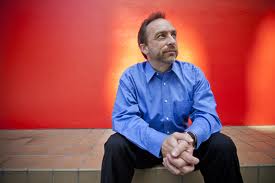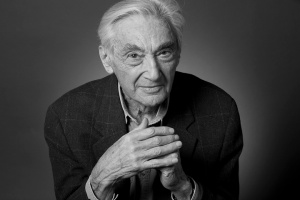Thar She Wikis: Jimmy Wales and Wikipedia
(This is my second look at Truth in Numbers. Click here for the first one).
Apple had Steve Jobs. Facebook has Mark Zuckerberg. And Wikipedia has Jimmy Wales.
And just like The Social Network and Jobs, Wales has a film about him.
However unlike Jobs and Zuckerberg, the film about the Wikipedia co-founder is not a major motion picture starting Hollywood actors. (Though I think Paul Giamatti would be perfect). Instead, Wales appears as the protagonist of the 2010 documentary Truth in Numbers? Everything According to Wikipedia. The documentary, co-directed by Scott Glosserman and Nic Hill interviews dozens of Wikipedians as well as authors, journalists and critics who have mixed views on the site, such as the late historian Howard Zinn, Bob Schieffer of CBS News, and former Central Intelligence Agency Director James Woolsey. But Wales is without question the central character.
Not surprisingly almost everything Wales himself does and says in the film casts Wikipedia in a good light. Indeed, the film starts with him visiting Varanasi, India where he teaches a local how to edit Wikipedia. That transitions into him speaking before an American crowd saying “Imagine a world where everyone on the planet is given free access to the sum of human knowledge. That’s what we’re doing.” From this start you get a sense that the documentary will focus on how Wales and Wikipedia is changing the world for the better. And there certainly is some of that. Glosserman and Hill show the international bonding of the Wikipedia community, as Korean, Indonesian, Chinese, Indian, Dutch, Taiwanese, Arabic, South African, English and American Wikipedians of both genders are interviewed. (Compare this to the “critics,” all but one of whom are men, and most of whom are old and white.) In one of the best lines of the film, a Taiwanese Wikipedian who earlier is depicted meeting a Chinese Wikipedian with whom he had collaborated on an article, says “Through Wikipedia it’s unbelievable I could make friends with a communist.” The other interviews with members of the Wikipedia community aren’t as touching, but they all do share a sincere sense of optimism about the site.
Yet, there is balance. As I mentioned in my first post, the documentary mirrors the Wikipedia site’s “Npov” mission to balance all articles. Glossmerman and Hill don’t really build any specific narrative, except that “Wikipedia is good but it also is bad.” The target of a lot of this criticism is Wales himself. About halfway through the movie, internet critic Andrew Keen says that Wales possesses the Libertarian suspicion of external authority first espoused by Ayn Rand. These comments frame clips of Wales talking about how Rand’s novel The Fountainhead influenced him (“My motivation is not altruism”), clips of Rand expounding her own philosophy (“I say man is entitled to his own happiness, and he must achieve it himself”) and clips of the 1949 movie version of The Fountainhead (“He served no one and served nothing. He lived by himself.”) Taken together, these clips depict Wales not as a man providing access to human knowledge for the benefit of humanity, but for his own ego.
Some of the other criticisms of Wales are less blatant, or even underdeveloped. Just like Facebook, there is controversy over who “founded” Wikipedia. The film describes how Larry Sanger and Wales came up with the idea of an open-source encyclopedia, eventually using Ward Cunningham’s “wiki” technology as a platform, and that the two had a falling out. Unfortunately, this story about the site’s early origins is brushed over. Sanger gets his moment to criticize Wales, stating that “When [Wales] first started leaving me out the story, it was extremely disappointing to me. It wasn’t something I would have thought Jimmy capable of.” However, instead of actually having to defend actions, Wales gets left off the hook. Right after Sanger’s jab, a nameless journalist interviews Wales, mentions that Sanger, “co-founded” the site, and Wales interrupts saying “he says” with a smile. And that’s it! It’s possible this story isn’t as juicy as the The Social Network. But by not letting Wales discuss his vision of the founding of the site, Glosserman and Hill lose a great opportunity to delve into their central character’s mind and better illuminate the foundation of the site they document.
In the end, I came away from the film feeling sorry for Wales. Keen points out that Wales — who doesn’t make any money directly off of the main Wikipedia site — is like someone who found a winning lottery ticket, but instead of cashing it in, donated it to the world. And clearly his personal life suffered from all this too. About a quarter into the movie Wales is interviewed in his Florida home, with his wife and daughter in surrounding him. It’s a very weird situation where he’s explaining how busy he’s been, and how he’s barely home anymore because he travels so much. Meanwhile, his wife is nervously laughing about this and how great it was to share an apartment in Japan for 30 days recently when Wales was working there (their last “vacation”). It’s clear the Wikipedia efforts are taking a toll on this marriage. Lo and behold, in a postscript at the end of the film, Wales admits that since that previous interview he separated from him wife. (He’s since divorced and remarried).
So while Truth in Numbers ends with all the interviewees reading their own Wikipedia page (Howard Zinn is quite impressed with the accuracy of his), I think a more fitting ending would be Wales staying up late, editing his own Wikipedia page, just like the last scene of The Social Network.
Documentary Review: The Anonymous Truth of Wikipedia
About half way through the 2010 documentary Truth in Numbers? Everything According to Wikipedia, historian Howard Zinn says “All history is a matter of selecting out of an infinite number of facts, and the selection itself is inevitably biased.” For example, in the traditional accounts of Christopher Columbus, the Progressive Era and the Civil War, historians routinely fail to mention, respectively, Columbus’ slaughter of native populations; the widespread lynching throughout America in the early 20th Century; and the massive amount of Indian land grabbing during the 1860s. All these examples, Zinn argues, show how in historical writing omission can be just as subversive as factual inaccuracies. Zinn believes this inherent bias can lead to a distortion of “the truth,” especially when amateur historians write on Wikipedia. As CBS News anchor Bob Schieffer adds “What’s worse, telling a bold-face lie, or just part of the truth?”
As its title indicates, Truth in Numbers? is concerned with how Wikipedia explores the “truth.”Interviewing dozens of Wikipedians as well as authors, journalists and critics such as Zinn, Schieffer, former CIA Director James Woolsey, Lawrence Lessig (who sadly only appears briefly at the beginning), and Wikipedia co-founder Jimmy Wales, the film focuses on the rise of Wikipedia in modern internet culture, and how it is shaping human knowledge.
Unfortunately, directors Scott Glosserman and Nic Hill mirror Wikipedia’s “Npov” policy, as the film itself doesn’t take sides. (To get even more meta, the “reception” section of the film’s Wikipedia page shows that almost all sides have a different interpretation of the film’s message.) Furthermore, there is very little narration, and in fact not much of an overarching narrative to the film. Instead, Glosserman and Hill jump from one interview to another, almost like the “Wikipedia wormhole” I mentioned two weeks ago.
The majority of the interviews revolve around how Wikipedia’s anonymity affects its accuracy and credibility. The first criticism is that it’s too easy to create inaccurate information. (As Stephen Colbert jokes in an interview with Wales, Wikipedia is the “First place I go when I want some knowledge, or want to create some.”) Wales’s brushes these aside, since unlike traditional encyclopedias, Wikipedia can easily change any error.
A lot of the critics also complain that the site lacks credibility since the editors are anonymous; one points out that traditionally people who wrote anonymously wrote things like ransom letters, poison pen letters and graffiti. This line of thought is pretty ridiculous, and in fact the next interviewee immediately points out that much of the early political writing in this country was done anonymously (such as the Federalist Papers). Regardless, Wales also brushes this aside. He thinks that by editing under established pseudonyms, Wikipedians are practicing “pseudonymity” not anonymity, and take pride in their pseudonym just like they would their real name.
The last major attack on Wikipedia’s credibility I think is the most valid: that its current system scorns “experts.” Wales states that his goal is for Wikipedia to be a meritocracy. But for it to be a true meritocracy, wouldn’t professors and experts rise to the top? Instead, as interviewee after interviewee lament, Wikipedians often look down on elitism, and thus there are few so-called experts on the site. Writer Simon Winchester concedes that having just experts is not ideal, since “experts” often include old white men, and that is a problem. (Of note, the actual Wikipedians interviewed are extremely diverse, whereas all but one of the “critics” are men, with most old and white.) Still, as Zinn notes, having some experts would be helpful, since everyone carries biases. So experts are needed to provide the right context.
Overall, I do think some of the interviewee complaints are valid. To avoid the issue of anonymously editing without repercussions, requiring everyone to register makes sense. And possibly it would be helpful to have experts at the top of the food chain to review articles, as Winchester says. Perhaps the best analogy of Wikipedia is one of the last comments. The head of the Biblioteche Alexandria in Egypt says that prior to the emergence of Wikipedia and the internet as a whole, the global fountain of knowledge was a very slow drip, and that most people in the would couldn’t “drink” from it. Now with Wikipedia providing free and open access to everyone in the world, it’s like opening a fire hose. However, you still can’t drink from that either. So the goal should be finding the perfect middle.
(I have a lot more to say about this documentary, especially about Wales. But it’s not as germane to digital scholarship, so I”ll write a separate post.)
(3/25/14 UPDATE: here’s a second blog post on Truth in Numbers, focusing on Wales.)


